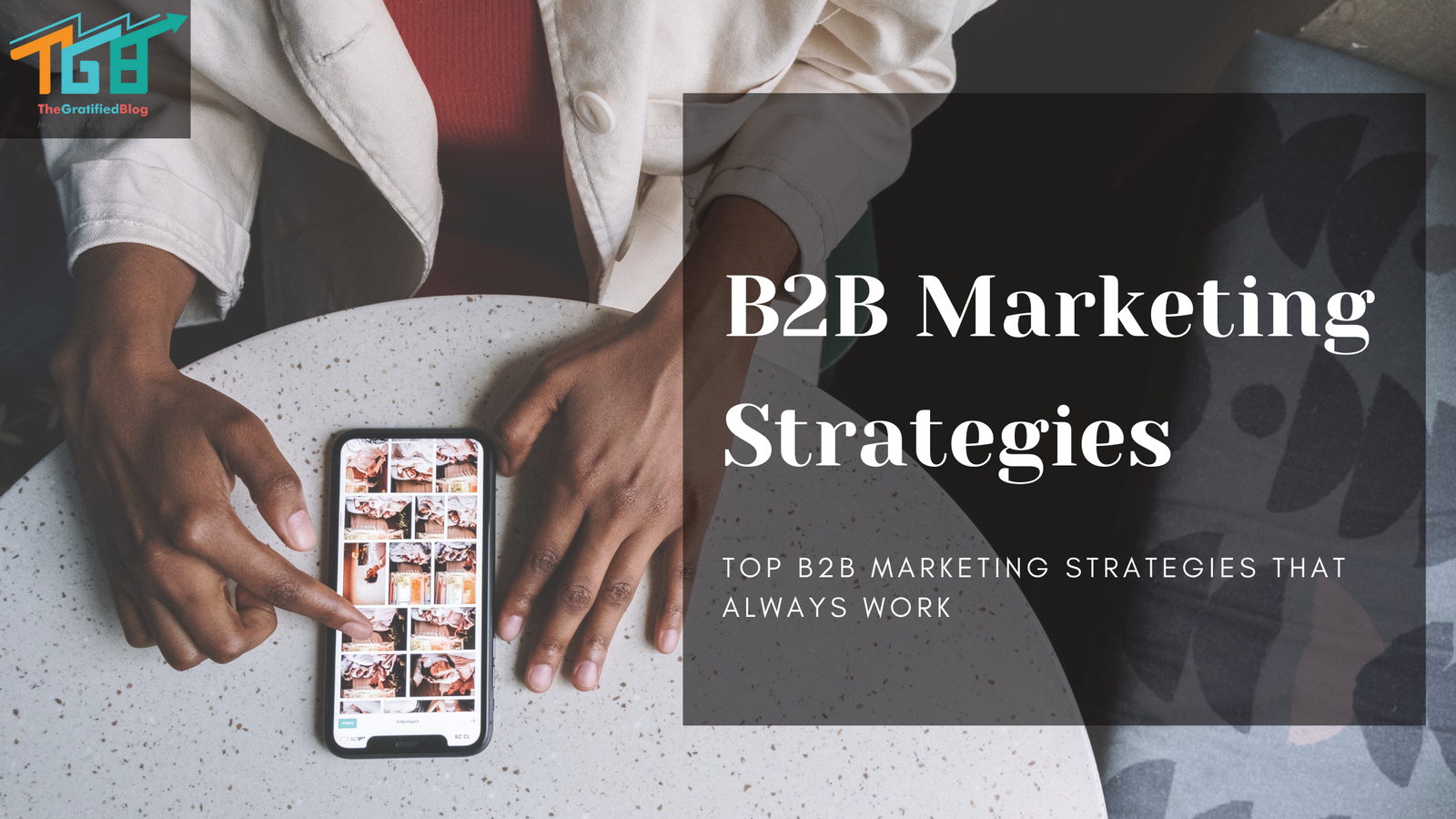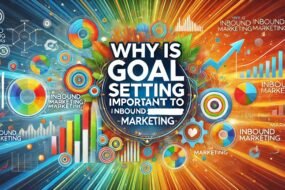
In the ever-evolving world of business-to-business (B2B) marketing, effective strategies can make all the difference. Whether you’re a seasoned marketer or just dipping your toes into the B2B waters, understanding the top B2B marketing strategies that always work is essential to achieving your goals. It’s time to grab the attention of your target audience, spark their interest, create a strong desire for your offerings, and prompt them to take action.
In this article, we’ll delve into a comprehensive guide on the proven B2B marketing strategies that can drive remarkable results for your business. We’ll explore a range of tactics, from leveraging the power of content marketing to the strategic use of social media, from embracing account-based marketing to optimizing your online presence with search engine optimization (SEO).
By implementing these strategies, you’ll not only captivate your audience but also build meaningful connections that translate into long-term business relationships and, ultimately, increased revenue. Whether you’re looking to generate quality leads, enhance brand awareness, or improve customer engagement, these strategies will equip you with the tools you need to succeed in the competitive world of B2B marketing.
What B2B Marketing Is Actually?
Business-to-business (B2B) marketing is the process of generating leads by reaching out to businesses or businesses that sell to businesses. This can be one business reaching out to another business or the same reaching out to multiple businesses.
B2B marketing involves reaching out to the decision-makers in a business rather than to the employees or customers. Hence, deciding to market to companies requires a different mindset than the regular advertisement to consumers. So understanding the key differences is an essential first step to execute these strategies successfully.
Key differences between B2B and B2C marketing
B2B (Business-to-Business) and B2C (Business-to-Consumer) marketing are two distinct approaches that cater to different target audiences and involve different strategies. Here are some key differences between B2B and B2C marketing:
- Target Audience: B2B marketing targets businesses, organizations, and professionals as customers, while B2C marketing targets individual consumers.
- Relationship Focus: B2B marketing typically emphasizes building long-term relationships with customers based on trust, expertise, and value, as B2B transactions often involve ongoing partnerships. B2C marketing tends to focus on short-term transactions and immediate consumer needs.
- Marketing Messaging: B2B marketing messages focus on business benefits, return on investment (ROI), cost savings, efficiency, and productivity improvements. B2C marketing messages emphasize emotional appeals, lifestyle benefits, personal satisfaction, and individual desires.
- Sales Process: B2B sales cycles are typically longer and involve multiple touchpoints, requiring relationship-building, negotiations, and customized proposals. B2C sales cycles are shorter, with a focus on driving immediate conversions through persuasive advertising and promotions.
- Marketing Channels: B2B marketing often utilizes professional networks, industry events, trade shows, email marketing, and content marketing to reach decision-makers and influencers. B2C marketing relies heavily on mass media channels like television, radio, social media platforms, and online marketplaces.
- Pricing and Negotiation: B2B pricing structures are often negotiated based on volume, contracts, and specific customer requirements. B2C pricing is generally fixed, with limited negotiation opportunities.
- Branding Approach: B2B branding tends to be more focused on reputation, expertise, and industry leadership, aiming to establish trust and credibility among businesses. B2C branding emphasizes emotional connections, lifestyle associations, and creating memorable experiences for consumers.
While both B2B and B2C marketing share common principles, understanding these key differences is essential for developing effective marketing strategies that resonate with the target audience and drive successful outcomes in each respective market.
Is B2B Marketing Really Important?
Marketing is one of the most important things when it comes to B2B businesses. It is the key to reaching out to people and helping them to find out about your business.
When you are marketing, you tell people about your company, what your company does, and how it benefits them to do business with your company.
Marketing will always help you keep your business in front of people and keep it fresh in their minds. Hence, it’s essential to market your business as soon as you start it. If you do not market your business, you’ll miss out on a lot of people.

How To Do B2B Marketing Effectively & Correctly?
To conduct B2B (business-to-business) marketing effectively and correctly, businesses need to adopt a strategic approach that focuses on understanding the needs and preferences of other businesses and building strong relationships with key decision-makers. Here are some key steps to help you do B2B marketing effectively:
Do Proper Research
B2B Marketing is one of the most complicated marketing channels. This is why it’s essential to do your research before you even start your marketing campaign.
Some things to consider when you are doing your research are:
- Who is your target audience?
- What is your target audience looking for?
- What strategies are your rivals using?
The more you know about your target market and competitors, the more you will be able to sell to them in the future. Without this initial research, your campaign could quickly end up in vain.
Understand Your Target Audience
Identify and define your target audience within the B2B sector. Understand their industry, company size, demographics, pain points, challenges, and purchasing behavior.
Create Buyer Personas
Develop detailed buyer personas that represent your ideal B2B customers. Consider factors such as job roles, responsibilities, goals, pain points, and decision-making processes.
Focus on Relationship Building
B2B marketing relies heavily on building trust and credibility with potential clients. Invest time in relationship-building activities such as networking, personalized outreach, and providing valuable insights and resources.
Attend Industry Events and Conferences
Participate in industry events, trade shows, conferences, and networking events where you can connect with potential B2B clients, showcase your expertise, and build relationships with key decision-makers.
Measure and Analyze Results
Track key performance metrics such as website traffic, lead generation, conversion rates, and customer acquisition costs. Analyze the effectiveness of your B2B marketing efforts and make data-driven decisions to optimize your strategies.
Provide Excellent Customer Service
Focus on delivering exceptional customer service and support to your B2B clients. Build long-term relationships by providing value, addressing their needs, and exceeding expectations.
Utilize Email Marketing
Develop targeted email campaigns to nurture leads and maintain communication with B2B prospects. Segment your email lists based on buyer personas and send personalized, relevant content to each segment.
SEO
Be it a B2B marketer, B2C marketer, or regular customer – everyone does a quick online search before purchasing anything. In such scenarios, if you fail to rank higher in the SERPs of those searches, you might lose a lot of leads. Hence, SEO always becomes vital for your business.
SEO (Search Engine Optimization) plays a crucial role in B2B marketing by improving visibility, driving organic traffic, and generating qualified leads. Here are key points to consider when implementing SEO in B2B marketing:
- Keyword Research: Conduct thorough keyword research to identify relevant keywords and phrases that your target audience uses when searching for products or services in your industry. Focus on long-tail keywords that have high search volume and low competition.
- On-Page Optimization: Optimize your website’s on-page elements such as page titles, meta descriptions, headings, and URL structures. Incorporate targeted keywords naturally within the content while ensuring readability and user experience.
- Quality Content Creation: Develop high-quality, informative, and engaging content that addresses the pain points and challenges of your target audience. Create blog posts, articles, whitepapers, case studies, and guides that provide valuable insights and solutions.
- Link Building: Implement a strategic link-building strategy to improve your website’s authority and credibility. Seek opportunities to acquire backlinks from reputable industry publications, directories, influencers, and partner websites.
- Technical SEO: Ensure your website is technically optimized for search engines. This includes optimizing website speed, mobile responsiveness, site structure, XML sitemaps, and robots.txt files. Conduct regular website audits to identify and fix any technical issues.
- User Experience: Prioritize user experience by ensuring easy navigation, clear site structure, fast load times, and mobile optimization. Aim to provide a seamless and engaging experience for your website visitors.
- Analytics and Measurement: Utilize web analytics tools, such as Google Analytics, to track and measure the performance of your SEO efforts. Monitor organic traffic, keyword rankings, conversion rates, and other relevant metrics to assess the impact of your SEO strategies.
By implementing effective SEO strategies in B2B marketing, businesses can improve their online visibility, attract relevant organic traffic, and enhance their overall digital presence. This, in turn, leads to increased brand awareness, higher website conversions, and ultimately, business growth.
Social Media Marketing
The whole digital era relies on social media platforms. Hence, social media marketing is one of the best ways to build a large and loyal customer base and connect and interact with them. Plus, it’s also a great way to promote your business and build brand awareness.
Social media marketing is an essential component of B2B marketing strategies, enabling businesses to engage with their target audience, build brand awareness, and drive leads. Here are key points to consider when implementing social media marketing in B2B:
- Platform Selection: Identify the social media platforms that align with your target audience and industry. LinkedIn is particularly relevant for B2B marketing due to its professional focus, but other platforms such as Twitter, Facebook, and YouTube can also be valuable depending on your goals and target audience.
- Audience Research: Understand your target audience’s social media behavior, interests, and pain points. This insight will help tailor your content and messaging to resonate with them effectively.
- Content Strategy: Develop a comprehensive content strategy that includes a mix of informational, educational, and engaging content. Share industry insights thought leadership articles, case studies, webinars, videos, infographics, and relevant blog posts to showcase your expertise.
- Influencer Collaboration: Collaborate with industry influencers and thought leaders to amplify your reach, gain credibility, and tap into their engaged audience. Partner with influencers to co-create content, host webinars, or participate in industry events.
- Engage and Interact: Actively engage with your audience by responding to comments, messages, and mentions. Encourage discussions, ask questions, and provide valuable insights to establish yourself as a knowledgeable resource in your industry.
- Paid Advertising: Consider utilizing social media advertising to target specific segments of your audience, promote gated content for lead generation, or increase brand visibility. Platforms like LinkedIn offer advanced targeting options to reach decision-makers and professionals.
- Analytics and Measurement: Utilize social media analytics tools to track and measure the performance of your social media efforts. Monitor metrics such as reach, engagement, click-through rates, conversions, and sentiment analysis to evaluate the effectiveness of your campaigns.

By leveraging social media marketing in B2B, businesses can strengthen their brand presence, foster meaningful connections with their target audience, generate leads, and drive business growth.
Influencer Marketing
Influencer marketing in B2B marketing involves leveraging the influence and expertise of industry professionals, thought leaders and influential individuals to promote products, services, or brand messaging to a target audience. Here are key points to consider when implementing influencer marketing in B2B:
- Identifying Relevant Influencers: Research and identify influencers who have authority and credibility within your industry or niche. Look for individuals who align with your target audience and have a significant following.
- Building Relationships: Cultivate genuine relationships with influencers by engaging with their content, providing value, and establishing rapport. Networking, attending industry events, and participating in relevant online communities can help in building connections.
- Setting Clear Objectives: Determine your goals for influencer marketing, whether it’s increasing brand awareness, driving lead generation, or establishing thought leadership. Align your influencer collaborations with these objectives.
- Collaboration and Content Creation: Work with influencers to create valuable and engaging content that resonates with your target audience. This can include blog posts, social media campaigns, webinars, videos, or podcasts.
- Long-term Relationships: Nurture ongoing relationships with influencers to foster continued partnerships and advocacy. Regularly engage with influencers even when not running specific campaigns to maintain the connection.
By effectively utilizing influencer marketing in B2B, businesses can enhance brand visibility, establish thought leadership, and drive engagement with their target audience.
Run Relevant Advertisements
The best way to attract new business is to advertise your products or services to businesses. Since businesses are end-users, the best way to promote them is to speak their language. This is why B2B advertising is becoming more popular, especially in this era, blessed with the internet.
When you advertise to businesses, you are sparking conversations between companies, which results in deals. B2B advertising is not limited to trade shows, banner ads, or direct mail campaigns. It is the conversation between businesses that takes place on social media, blogs, direct emails, and conferences. Here are key points to consider when running relevant advertisements in B2B marketing:
- Define Clear Objectives: Determine your advertising objectives, whether it’s increasing brand awareness, generating leads, promoting a specific product or service, or driving conversions. Clear objectives will guide your ad strategy.
- Target Audience Segmentation: Segment your target audience based on relevant criteria such as industry, job title, company size, or geographic location. This allows you to create personalized and targeted advertisements that resonate with specific segments.
- Research and Selection of Advertising Platforms: Research different advertising platforms that align with your target audience and goals. LinkedIn Ads, Google Ads, industry-specific publications, and social media platforms like Facebook and Twitter can be effective options.
- Call-to-Action (CTA): Include a clear and compelling CTA in your advertisements to prompt desired actions from the audience. Whether it’s signing up for a webinar, downloading a whitepaper, requesting a demo, or contacting your sales team, make the desired action explicit and easy to follow.
- A/B Testing: Conduct A/B testing on different ad variations to optimize your campaigns. Test different headlines, images, ad formats, CTAs, or targeting parameters to identify the most effective combinations.
- Tracking and Analytics: Utilize tracking tools and analytics to measure the performance of your advertisements. Track metrics such as impressions, clicks, conversions, cost per lead, and return on investment (ROI). Adjust your advertising strategy based on data insights to optimize campaign performance.
- Retargeting: Implement retargeting strategies to re-engage with users who have shown interest in your products or services. Display relevant ads to them across various platforms to stay top-of-mind and encourage conversions.
- Monitoring and Optimization: Continuously monitor your ad campaigns and make necessary adjustments to optimize their performance. Pause underperforming ads, reallocate the budget to high-performing ads, and experiment with new strategies to improve results.

By running relevant advertisements in B2B marketing, businesses can effectively target their ideal audience, increase brand visibility, generate leads, and drive conversions. Strategic ad placement, compelling messaging, and ongoing optimization are key to achieving success in B2B advertising campaigns.
Provide Value
Your customers want to know they are buying from a reputable business. With a B2B business, many customers will buy a product, but they won’t buy it again unless they feel treated fairly and get the value they are looking for.
Poor service and user experience can harm your business. If customers have a negative experience with your company, they will move to another company that can offer them a better experience. Hence, before taking on any marketing, ensure that you provide the exact value your customers are looking for.
Providing value is a crucial aspect of B2B marketing as it helps build trust, establish thought leadership, and foster long-term relationships with customers. Here are key points to consider when providing value in B2B marketing:
- Understand Customer Needs: Conduct thorough research to understand your target audience’s pain points, challenges, and goals. Identify their needs and align your marketing efforts to address those needs effectively.
- Educational Content: Develop and share educational content that offers valuable insights, industry trends, best practices, and solutions to common challenges faced by your target audience. This can include blog posts, whitepapers, case studies, e-books, webinars, and podcasts.
- Personalization: Tailor your marketing efforts to individual customers or specific customer segments. Customize your messaging, offers, and recommendations based on their specific needs and preferences. Personalization enhances the perceived value of your offerings.
- Customer Success Stories: Highlight success stories and case studies of how your products or services have helped other businesses achieve their goals. Showcasing real-world examples of value creation builds credibility and trust.
- Free Resources and Tools: Offer free resources, tools, or templates that assist your audience in their day-to-day operations. This could include checklists, templates, calculators, or software trials. Providing these resources establishes your brand as a helpful and reliable partner.
- Responsive Customer Support: Provide excellent customer support that is prompt, helpful, and personalized. Address customer inquiries, issues, and concerns in a timely manner. A positive support experience adds value to your customers’ overall perception of your brand.
- Continuous Learning and Improvement: Stay up-to-date with industry trends, evolving customer needs, and emerging technologies. Continuously improve your products, services, and marketing strategies to stay ahead of the competition and meet evolving customer expectations.
By providing value in B2B marketing, businesses can differentiate themselves, build strong relationships, and position their brand as trusted advisors. Delivering educational content, personalized solutions, thought leadership, and exceptional customer support contribute to customer satisfaction and long-term success.
Embracing Innovation in B2B Marketing
Embracing innovation in B2B marketing is crucial for businesses to stay competitive, adapt to evolving customer needs, and capitalize on emerging technologies and trends. Here are some key areas where innovation can make a significant impact in B2B marketing:
- Data-Driven Decision Making: Leveraging advanced analytics and data-driven insights can help businesses make more informed marketing decisions. By collecting and analyzing data from various sources, businesses can gain valuable insights into customer behavior, preferences, and market trends, enabling them to tailor their marketing strategies for better results.
- Personalization and Customization: Utilizing innovative technologies and marketing automation tools allows businesses to deliver personalized and customized experiences to their B2B customers. By understanding individual customer needs and preferences, businesses can create targeted campaigns, personalized content, and tailored solutions, leading to higher engagement and conversions.
- Content Marketing and Thought Leadership: Embracing innovative content formats and distribution channels can enhance B2B marketing efforts. Businesses can leverage mediums such as interactive content, video marketing, podcasts, and webinars to provide valuable information, showcase thought leadership, and engage their target audience effectively.
- AI and Automation: Integrating artificial intelligence (AI) and automation into B2B marketing processes can streamline operations, improve efficiency, and enhance customer experiences. AI-powered chatbots, marketing automation platforms, and predictive analytics can help automate repetitive tasks, deliver personalized interactions, and provide real-time insights for better decision-making.
- Virtual Events and Experiences: With the rise of remote work and digital connectivity, virtual events, and experiences have become essential in B2B marketing. Embracing innovative virtual event platforms, webinars, online conferences, and networking opportunities can help businesses reach a global audience, foster engagement, and generate leads.
- Agile Marketing: Adopting agile marketing methodologies and processes allows businesses to respond quickly to market changes, test, and iterate campaigns, and optimize results. By embracing innovative agile practices, businesses can adapt their marketing strategies, experiment with new approaches, and drive continuous improvement.
In summary, embracing innovation in B2B marketing is essential for businesses to stay competitive, meet evolving customer expectations, and leverage emerging technologies and trends. By adopting innovative strategies and technologies, businesses can enhance personalization, improve customer experiences, leverage data insights, and drive successful B2B marketing outcomes.
In A Nutshell
The demand for marketing professionals with experience in the B2B space has risen dramatically over the last few years. As a result, several companies have evolved to fill this demand.
Hence, if you are a marketer looking to break into the B2B world, you’ll need to have strong b2b marketing strategies ready to stay on top. Furthermore, if you have any issues regarding the above strategies, we would love to solve them in the comment section below!








One reply on “Top B2B Marketing Strategies That Always Work”
Thank you for this amazing blog post, useful information
Looking forward to more content from you!
Thanks.